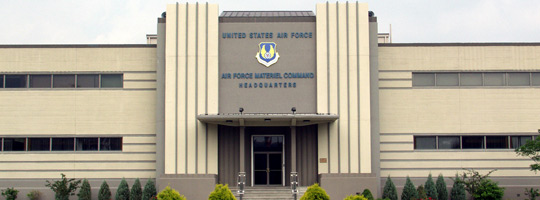
Air Force Materiel Command at Wright-Patterson AF Base, Dayton, Ohio (image: USAF).
While lecturing in Dayton in 1990, I finally had the opportunity of visiting Wright-Patterson, where Blue Book was stationed for years under the Foreign Technology Division. The only section open to the public is the famous Air Force Museum, which contains just about every known aircraft from the Wright Brothers to the Stealth fighter. I had read somewhere there was a small Blue Book exhibit at the museum, but it was not in the two main hangars with all the planes. My host from Dayton of course knew that the exhibit, a small glass panel, was at the entrance of the cafeteria. It consisted of a few photos (mostly hoaxes), various pieces of junk reported as UFO debris but all man-made industrial items, and a few other things. The most colorful item was the “UFO Pancake” from the Eagle River, Wisconsin, case of April 18, 1961.
This is one of the truly great stories of Americana saucer folklore. On that date, a flying saucer landed allegedly on Joe Simonton’s chicken farm in Eagle River, and its occupants offered him six pancakes in exchange for plain water. The “ET pancakes” were sent to Wright-Patterson when Col. Robert Friend was at Blue Book’s helm (1958-63). In 1992, I had the opportunity of interviewing the retired colonel at length at his home in Irvine, Calif., with my friend and colleague Alex Chionetti. He told us many stories, including that of Joe Simonton. It turned out that it was Friend who put the little Blue Book display together at the Air Force Museum, pancakes and all.
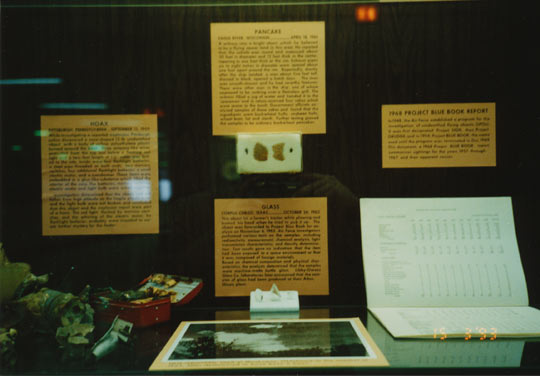
The Blue Book display at Wright-Patterson.
“Yeah, I put them there,” he told us, “there were six of them originally and after I brought them back, what I did was to send three of them to the labs. I sent one to the Food & Drug Administration, and I sent one to a lab in New York called Sam Tuttle [phonetic spelling], which we had under contract… FDA not only told me that they were pancakes, but they would tell me whose they were, and what the composition was, just everything laid down, Sam Tuttle lab in New York gave me the complete composition and they would match, that’s why I send them to two places… so then I talked the entire story over with the psychologist.”
Col. Friend also revealed how Blue Book’s UFO Questionnaire was developed: “The Questionnaire really and truly never basically changed, the Air Force had paid a lot of money to have that Questionnaire developed, it was developed by the psychologists at the University of Ohio, they came up with it, and the questions were supposedly devised so that you would be able to tell whether or not the person was fabricating or not. I never really understood how myself but that’s what you were supposed to do, and because the questions were directed so they would ask the same question some time later in a different form, see whether or not they compare the answers.”
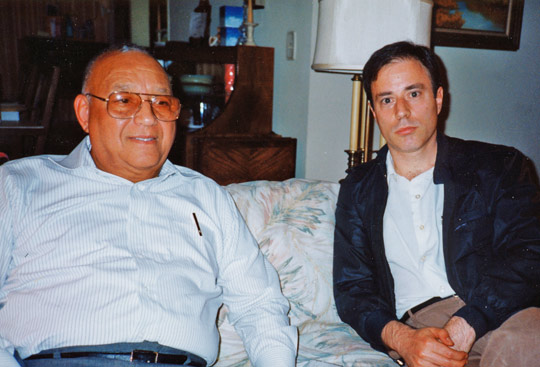
Col. Robert Friend with Antonio Huneeus (Author) in 1993.
(Image: Alex Chionetti)
Antonio’s entire interview with Col. Robert Friend:
RF: No, it’s OK, when I talked with [Stanton] Friedman about it [The alleged Roswell crash], I talked a bit about some of the unrealistic aspects and I heard him recently on Michael Jackson’s show here, a radio show, and it seemed to me that what it happened he had softened some of these areas… if you go out and pick a piece of material and you say, boy, I can’t do anything with it, I can’t bend it, I can’t burn it, I can’t do anything to it in any way to destroy it, but yet you have a piece of it, where in the world you get a piece if nothing can happen to it, in other words, it still should be part of the entity, well and if, if all of what you say is true, it takes so much force in order to grate that material apart, there is no way in the world that anybody can convince me that a body should survive, I’ve investigated aircraft accidents, and I’ve found nothing of the individual when the aircraft was in pieces, and especially in a circumstance like that; and the other thing they indicated for instance that the bodies had been taken to Wright-Patterson.
AH: Hangar 18, right, that’s the legend.
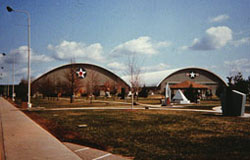
Wright-Patterson Air Force Museum.
RF: Well, I don’t understand why they were taken to Wright-Patterson when Brooks, which is the medical center, was right there in Texas, it would seem to me it was near, logically, and the other thing, if that impact took place, certainly people all over the place should have heard if it was to the extent that it ruptured that thing…
AH: But it was in a very remote place, not near Roswell but Corona, you know, in a ranch.
RF: Yeah, but I understand remoteness, but the guy, it was on his place and he didn’t even know it was there until he went out to work on his place and came across it. He didn’t hear anything?
AH: But what you make of the fact that, I mean, that there is no doubt that they did find these pieces.
RF: I have no doubt they found something, that’s why I say that it’s unfortunate that people mix fact and fiction, or fact and imagination, because if you didn’t have to do anything except follow the fact all the time, I think they would a lot better off rather than trying to sift through information and say, this is good and this isn’t, because I don’t think I am smarter enough to be sure to pick what’s alright and throw out what’s all wrong, it’s like anybody that goes out, it doesn’t matter how open-minded you are, to investigate something, you can’t help but have your experiences color the way in which you view and the approach you take to the investigation, if for instance, who is to say if they are visitors here of any kind that they are our size, for instance they might be, you might be walking all over the evidence looking for something if you think…
Alex Chionetti: We were talking about yesterday, now everybody is mixing science-fiction like underground bases and mutilations…
RF: Well, these are some of the inconsistencies too, if we have had people or beings that have come here in a spacecraft and we have to presume that those individuals were not just dogs and cats and so forth riding in a vehicle but rather if you say under intelligent control, we have to mean direct intelligent control, not remote intelligent control, and that we have had this contact and these beings are still around, God, I would expect our space program would be a whole further ahead than it is, we wouldn’t be blowing Challengers up, certainly it would be a heck of lot more sophistication introduced into the program that what we currently have, it’s sophisticated enough from our viewpoint, but it isn’t as sophisticated as what we are thinking about.
AC: You saw this case of Bob Lazar?
AH: Area 51, you know, this guy who claims they have nine flying saucers, I don’t know if you’ve heard about him.
RF: Yeah, I just find it hard to feel that our government should function in such clearly defined segments, that these guys over here are trying to do space programs and these guys over here have far out sophisticated machines that can do a heck of lot more, I don’t believe it that the government, there is no way in the world that they could keep the two from mixing in some way.
AH: When you were in Blue Book, there were no rumors of these things, I mean among military people, not the writers.
RF: There were, let me put this way, there were views in both directions, OK, both directions I mean the Navy really ridiculed the program even to the extent that in the Pentagon some of the offices, the Air Force put their Unidentified Flying Objects report, the Navy would put Unidentified Floating Objects, you know, we got UFOs too, we got Unidentified Floating Objects, and the, but on the other hand, there was an element that in all the services, and I am sure it’s there, that there was something there that we really needed to investigate, by the way, we felt too that what we wanted to do if we could is to determine what it was that these people were experiencing, and we wanted to do that, even though it really and truly overstepped the limits of our charters in some way, our charter was to determine whether or not it constituted a threat to national security, and if we could get an answer to that, we weren’t necessarily interested beyond that, not because we personally weren’t interested but because the funds and so forth that were allocated to the program didn’t allow us to pursue it beyond that; if we could get an answer, we got it, but if we could answer the first question, then we didn’t worry too much about the follow-up questions, that was one of the areas where Dr. Hynek was most interested, what he was saying was that if there is some scientific paydirt here, then we really and truly ought to have it. Now, I wrote two staff studies and both of them were directed towards having the program either extended into an area such as research and development and/or advanced research, so that the people who had the funds allocated to a follow-on effort to see if they could indeed take the information and pursue it to the next step, OK, and I think that in both instances, one to have it transferred to NASA, and the other have it transferred to the Air Force Research and Development people, or to the Advanced Research Projects Agency, well, in both cases it fell through, in other words, somewhere the decision was made that, no, we’ll leave it where it is and we’ll do it the way we are doing it.
AC: You are talking about the late fifties?
RF: I am talking about, well, I can’t remember the exact time period, but it seems to me that I wrote one almost as soon as I was there, that was about 1959, and I think the next that I wrote was about 60, 61, somewhere like that.
AH: What was the time frame which you worked for Blue Book?
RF: I was there from 58 to 63, I really and truly was assigned to the job because the timing was right, I went in there really and truly with the job of being concerned with satellites, and to be concerned with those things that were happening in the scientific community that were associated with these things, so my job was actually much broader than the phenomena, the unidentified phenomena, but it was an extension of what I was doing.
AC: You were talking of spy satellites?
RF: Well, there weren’t spy satellites in those days, but we are talking about the early things like Sputnik, Echo.
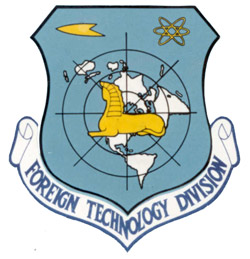 AH: You were with the Foreign Technology Division?
AH: You were with the Foreign Technology Division?
RF: Yes, that’s correct.
AC: Communication satellites too?
RF: Well, those were things yet to come, but the idea was that we knew that the technology and the science that was being developed at that time would probably be able to evolve into these capabilities, like for instance, we used to keep moon watch information at that time the way in which the information as to where from these moon watch teams all over the world, these guys would sight, give us the information, plot it, orbit information, well, Gregory, who was running the program at that time, had applied to go to school, the Air Force had programs where what you would do, you wanted to get your college degree, you would do the first three years by correspondence, and then you would go to school for the last year, he had reached that point, so the job was vacant.
AH: So you took over?
RF: They gave me that part of the job in addition to the other things I was doing.
AC: And when you took the job was a kind of…
RF: Well, at the time that I took it over I had been involved with it indirectly once because I was stationed down in Alabama and there was a report that came in and I went out to investigate, and actually what it turned out to be was one of the Rawin [?] units, you know, what happens it goes up in a balloon, then it gets released in a parachute, it comes down and the parachutes are red, and what happened was, it fell into an area where the people had never seen one of these things, boy, they were scared to death, it was up on a tree, and they reported it, well, they didn’t know what it was, they really and truly didn’t think in terms of Martians or anything like that, but they were afraid of it, they wouldn’t come out of their homes, something was out there, you know, it would go on or explode or whatever, and the experiences that people had had from World War Two, we sometimes give the public enough credit to being able to know about things, and at the same time, don’t themselves spread the word, so there could be panic or what have you because the Japanese were indeed bombarding our country at that time by balloons.
AH: The Fugo balloons, right.
RF: Yeah, but these balloons they were just dropped, we had detachments strategically all over the country and that traced out each one of those things that were reported, anything that was reported like that, they would try to neutralize that, so anyway even though this is Alabama and you wouldn’t think in terms of getting that far because naturally you would think most of them would fall on the west coast, but those people, they would not leave their homes, we got it down and show it to them what it was and told them, but they still kept their distance.
AH: Blue Book worked that way, right, when there was a sighting, they would have the Air Force Intelligence in various bases do the investigation?
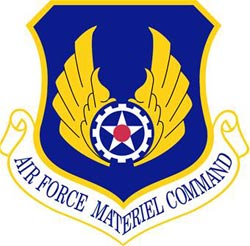 RF: That came later, it’s really strange as I said, the first paper that I wrote trying to get us into the Research & Development community, and the R&D community felt we were so bogged down with this thing has because of the public relations aspect of it, probably get us sidetracked from the kinds of things we wanted to do, which I think was reasonable, but later when they took, when the program first started it was a part of an intelligence organization that was within what was called the old AMC, the Air Materiel Command, and the Air Materiel Command had this organization which functioned to look into foreign technology–later they decided–at this point it was through Ruppelt, Ruppelt did everything himself, when they first started he went everywhere, now later, what they did was to take that foreign technology organization out from AMC and put it directly under the Assistant Secretary, the Assistant Chief of Staff Office for Intelligence, so now it was directly under Air Force level, even though it was still sitting in Wright-Patterson, they just took it, put it into another complex and said, you are on your own, right, so that’s what they did. Now, later they decided that since the information these people are getting is used mostly by our R&D people, for instance, if we found out that some foreign country is developing something that we feel either needs to be neutralized or we need to duplicate, or we have to worry about whether or not it’s going to have any kind of counter-active impact on something we are doing, that what we have to do is change the way we are approaching a problem in order to approach a new problem which is going to counter a threat this poses. Well, so now they took Foreign Technology and put into Research & Development, so R&D ended up with it anyway even though second-hand, so now before that, while it was still ATIC, the Air Technology Intelligence Center, what happened then was they had their own detachments and these detachments that they had were residuals from these people that were out in the field to look for those Japanese balloons, so they were all and that’s what they were using to do the investigation of UFOs, that’s one of the reasons why in the early days you could say that there was at least a measure of consistency in the capability of the people that were doing the investigation, one, they were trained for that sort of thing, two, they were technical people in all instances, OK, so they would go out and do this job. Now, gradually, that organization started to shrink, each one of the detachments started to disappear, I can’t remember the exact number that they were in the country, but I remember they went down to 12, then down to 4 and then finally down to 1, and that 1 was located in Virginia. Well, after the organization moved into the Research & Development community, now we had to redo all of the directives because originally all of those directives were written directly from the Air Force level, now we had under our directive that were written from the Research & Development Commander, they became R&D directives, and that directive said that each one of the bases would now be responsible for setting up a capability to go out and do this job, in conjunction with that I also wrote what is called the request for a special action on the part of the Inspector General, which meant that anytime an installation went through a routine inspection by the Inspector General, he was to take a look at how you were handling the UFO problem specifically, so it became a special question.
RF: That came later, it’s really strange as I said, the first paper that I wrote trying to get us into the Research & Development community, and the R&D community felt we were so bogged down with this thing has because of the public relations aspect of it, probably get us sidetracked from the kinds of things we wanted to do, which I think was reasonable, but later when they took, when the program first started it was a part of an intelligence organization that was within what was called the old AMC, the Air Materiel Command, and the Air Materiel Command had this organization which functioned to look into foreign technology–later they decided–at this point it was through Ruppelt, Ruppelt did everything himself, when they first started he went everywhere, now later, what they did was to take that foreign technology organization out from AMC and put it directly under the Assistant Secretary, the Assistant Chief of Staff Office for Intelligence, so now it was directly under Air Force level, even though it was still sitting in Wright-Patterson, they just took it, put it into another complex and said, you are on your own, right, so that’s what they did. Now, later they decided that since the information these people are getting is used mostly by our R&D people, for instance, if we found out that some foreign country is developing something that we feel either needs to be neutralized or we need to duplicate, or we have to worry about whether or not it’s going to have any kind of counter-active impact on something we are doing, that what we have to do is change the way we are approaching a problem in order to approach a new problem which is going to counter a threat this poses. Well, so now they took Foreign Technology and put into Research & Development, so R&D ended up with it anyway even though second-hand, so now before that, while it was still ATIC, the Air Technology Intelligence Center, what happened then was they had their own detachments and these detachments that they had were residuals from these people that were out in the field to look for those Japanese balloons, so they were all and that’s what they were using to do the investigation of UFOs, that’s one of the reasons why in the early days you could say that there was at least a measure of consistency in the capability of the people that were doing the investigation, one, they were trained for that sort of thing, two, they were technical people in all instances, OK, so they would go out and do this job. Now, gradually, that organization started to shrink, each one of the detachments started to disappear, I can’t remember the exact number that they were in the country, but I remember they went down to 12, then down to 4 and then finally down to 1, and that 1 was located in Virginia. Well, after the organization moved into the Research & Development community, now we had to redo all of the directives because originally all of those directives were written directly from the Air Force level, now we had under our directive that were written from the Research & Development Commander, they became R&D directives, and that directive said that each one of the bases would now be responsible for setting up a capability to go out and do this job, in conjunction with that I also wrote what is called the request for a special action on the part of the Inspector General, which meant that anytime an installation went through a routine inspection by the Inspector General, he was to take a look at how you were handling the UFO problem specifically, so it became a special question.
AC: What Questionnaire was used at that time?
AH: The Questionnaire really and truly never basically changed, the Air Force had paid a lot of money to have that Questionnaire developed, it was developed by the psychologists at the University of Ohio, they came up with it, and the questions were supposedly devised so that you would be able to tell whether or not the person was fabricating or not, I never really understood how myself but that’s what you were supposed to do, and because the questions were directed so they would ask the same question some time later in a different form, see whether or not they compare the answers.
AC: It was done by psychologists?
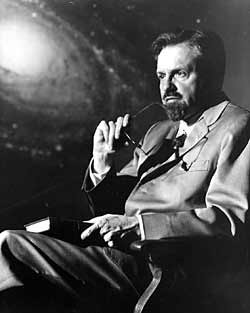
J. Allen Hynek (image: Northwestern University)
RF: It was put together by psychologists, because when Dr. Hynek first took on the job, he wasn’t at Harvard, that’s where he was.
AH: Ohio State University?
RF: Yeah, he was over there, so anyway, the next thing that we had the bases performing these tasks, I think you can appreciate because each base has a different mission, that you are going to find different kinds of people to do these jobs, like for instance, if you take the installation downtown in space division, they got a lot of scientific people and they got a lot people who are concerned with things that happen in space and so forth, so you would anticipate a really top notch job out of a guy like that, but if you have another base someplace else whose mission was principally to fly airplanes, right, you might get some better views of how pilots feel about what happened, but as far as a strong technical background, to give that information, you won’t necessarily have that… Now, as far as the analysis was concerned, when those things came in to us, then what we would do was to get them in the hands of those people that we felt were best qualified to answer the kinds of questions that seemed to be [contained] in the report; if it was a radar report, it went to the radar section, that’s what they were doing, they get that all the time; if it was something that had photographs involved, what we do was is get it to the photographic section, to the photo interpreters, and also we would send it on to people like Kodak for analysis.
AC: Which was the more enthusiastic department to receive information on UFOs?
RF: Really and truly, nobody ever really looked down at it because of the source, principally because the initial source as far as they were concerned was always possibly some field element, and when it came in then they knew it was important for them to be able to get, another thing to it is that in the intelligence community, you don’t throw anything out because you might be throwing the baby out with the water, you have to be very careful; if you are in the intelligence community and information is flowing in, you really and truly don’t have any way to know what the true source is because that wouldn’t be revealed to you, you get information, right?, and what you had to do is sift through this information and try to see whether or not there is anything there that will be beneficial, it could be anything, even though in a lot of instances what you try to do was to make a determination of, somebody somewhere in the system would rate the source from where it came, read the information and rate the source, that’s what intelligence information is, I don’t care what is on, because what they are trying to do is, the guy, you sit there and information is coming to you, swarms of information and you don’t want to sit there and complain all day long, somebody somewhere in the system says, hey, you don’t know, it’s very shaky, well because, as I am sure you can appreciate, UFO cases can come in classified and someone looks at it and says, Oh boy, this is classified report, but a report could come in classified for any number of reasons: the information can be classified itself, or the source can be classified, in other words, they say, well, we don’t want this to get around that this is where we get information, so they put a classification on it; and/or it can be classified because of timing…
AC: Were there many classified [UFO] cases?
RF: Well, yeah, we had some pilots in Alaska report when the Soviets exploded their first A [or air] burst and they reported a UFO, they saw this big, but the thing was that we knew the answer because we had gotten through other channels that they had one of these things off, and then all we had to do is to say, time, direction, and everything else, yeah, we knew what it was, right, and the reports that came in and supported it were classified because of sources, and their reports were wide open, but OK, we know what it is, no sense in bothering to either try to co-relate it or explain it. Now, later when they started publicizing the information that yes, and so forth, but in a lot of instances I think that people in the intelligence community don’t want the other guy to know that they know, and the only way you can keep that secret is to say, well, we can’t talk about it because the first time they hear us talking about they’ll know that we know, and also because sometimes timing in intelligence incidents can make them say, OK, this happened, they got this information and we know when they got it, so now let’s see, whom should we start trying to look around and see whether or not that guy passed it…
AH: Any memorable [UFO] case that you can think of that couldn’t be explained? They used to call them ‘Unknown’, right?
RF: Well, we always call them, we indicated that we just didn’t have an answer for them, it could say ‘Unknown’ or ‘Unexplained’ or what have you, I think to go ahead and say it’s unknown is I think an honest way to approach it, to say unexplained means like, maybe I can explain it but I won’t, right, so we just leave it unexplained, even though as I said, they were some things in these categories very much like I just explained to you, like the first Soviet air burst, and of course there were other things that could happen, for instance, they were testing some of the reentry vehicles and so forth, people could see these, it’s, I think all of us are aware that we have overt and covert intelligence and that sometimes we don’t mind being overt the things that we do, and in those instances where it’s covert the idea is that we are hoping something a lot bigger that the everyday kind of thing that gets reported, the air attachés go out, you know, and watch the parade to see the tanks go by and they see all these things, they can see all kinds of technical details, but that’s all well and good because external views and things like that while, in a lot of instances are cause for classification, depending on what you see they cover it up or disguise the shape or something like that if that was important, but it’s the guy that gives you the things that are going on inside…
AC: Would you say that in your period there was misinformation coming from the CIA?
RF: I don’t know, I don’t believe that any intelligence organization would not follow up a hot item that was brought to its attention, whether it had assigned responsibility for a particular area or not, like we, the Air Force, we had UFOs and that was supposed to be our baby, but I don’t believe that Navy Intelligence person some place would say, Oh, pass it to the Air Force and forget it, I think that if he thought that whatever it was needed investigating, he do it.
AH: Yeah, there are many documents now that have been declassified from other agencies.
RF: Sure, sure, and I think it’s the same thing from almost any agency, not only that, I would think that if these agencies, say like the CIA, if they were onto something, and they were not sure what their total ramifications were that probably, probably it would not find its way out of there, at least until, I mean, for incoming examination among the intelligence community because I think it’s the nature of the operation.
AH: So not necessarily all the information that the government was collecting would have gone to Blue Book?
RF: That’s what I would think, I would say that they would not mind giving it to us if they thought, you know, but if they thought that it had other ramifications that were probably well within their bearing I don’t believe that they would pass it on.
AC: Yeah, that’s the reason that I am suspicious with the story of MJ-12 [alleged secret UFO management group]. I remember I asked [Major Hector] Quintanilla if he heard sometime about MJ-12, and he said he didn’t and I believe him.
RF: Well, there is sort of inconsistencies there, too, some of the things about that, I saw that document, was a copy, and it was about the most terrible typing job that I’ve ever seen for the president, I don’t know who did that but certainly you would have been able to find somebody that could type better than that, and also whose English would have been a little better, the next thing is that, if you remember Dr. Menzel’s name was on that list.
AH: Right.
RF: OK, but Dr. Menzel in writing his book came to Wright-Patterson and stayed there and I helped him put together the information that went into his book, in other words, he needed the cases, we talked, discussed the cases, so forth, he didn’t know anything more about what was going on in that program until he came up there and got a chance to see.
AH: So you knew him quite well?
RF: Oh, I did quite well, in fact, we had talked quite a bit about a number of things, Dr. Menzel had been in the Navy.
AH: During the war.
RF: That’s right, and in the Navy what he had done was go out and make some flights through over the North Pole and in the Arctic region, and he had some personal experiences with things that were like this and were startling even to him, even though he was later able to now understand what it was that he saw, but the kind of phenomena that happens in those regions with extreme temperatures and these various other conditions, he talked about it, he talked openly about it because they were some of the same experiences that radar, that’s what he was doing, he was in the electronic transmissions area in the Navy, because they couldn’t understand why some of the radar was acting so strange up in that region like, for instance, they at one time thought they were being invaded because they saw all this activity going on, and they didn’t realize that what had happened that, even though radar line of sight that what happened is they had gotten a reflection and they were looking much further away that what they thought they were looking, you know, so the radar [image] was something like a mirage.
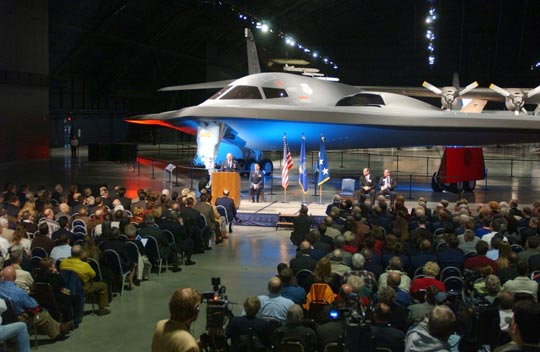
Stealth bomber being placed into the Air Force Museum at Wright Patterson (image: USAF).
AH: After you left Blue Book in ‘63, but you stayed in the Air Force?
RF: I stayed for that entire time, we had Congressional inquiries.
AH: So you were still somewhat interested or involved after you left?
RF: Well, after I left the program I was still in the intelligence community and I was in Japan right after I left the program, we had, there an awful amount of reports that came out of Japanese pilots.
AH: So you were having reports from Japanese pilots of UFOs?
RF: Well, they weren’t coming to me, but I learned of them, yeah.
AC: Was there a lot of activity in Japan?
RF: A lot of activity? Well, they had a lot of activity but all of a sudden it stopped, I think that the Japanese air force, not the air force, they were mostly airline pilots at the time, I don’t remember ever hearing of a report coming from one of the self-defense pilots, and I was interfacing quite a bit with the Commander of the Research & Development Command, and he was a Lt. General, he never said anything at all, and I was in Korea over that time, in Korea I never, never heard anything at all. Now, while I was still with the program we had had some reports out of the Southeast Asia area, some of from some of the religious people in the areas…
AH: Oh, that’s right, that was a famous case in Papua that was during your time?
RF: Yes, and also the Science Advisor to the Indonesian Air Force came to Wright-Patterson and he was very much interested over that, stayed around, he was in an Air Force-sponsored trip and stayed around there for about a week, and the things he was interested in mostly was anti-gravity devices, that’s what he was interested because they were doing a lot of work, his name was Harenoto, Dr. Harenoto.
AH: I have a letter from Marshall Nusredin, I think it was his name, he was the Commander-in-Chief of the Indonesian Air Force from around ‘67, it wasn’t written to me, it was written to a Japanese TV producer, where he says that they had many cases and that at one time they opened fire against the UFOs, it was very open-minded.
RF: Yeah, yeah, this guy, he told me a lot about that, he was…
AC: In that area [Asia] they are more believers because of spiritual or religion affects them.
RF: Well, you know, they are, I think all of us recognize a lot of things sometimes start to color the way in which we feel about something, I read [Kenneth] Arnold’s case time and time again, and one of the things in there, have you read it?
AH: Arnold’s case? Sure.
RF: Have you read his statements? You know what he was doing at this time, trying to search for wreckage?
AH: For a Marine plane, right.
RF: …he told everybody what the conditions were and if the conditions were like that, then it’s more than likely you are in a position to experience these looming mirages, and these looming mirages really and truly, if you’ve flown through these areas like I have, it looks like it cuts off the top of the mountains, that’s all, all you see is the top of the mountains, just the tops, and you see these tops like that, now as the geometry changes, as you move along, one would disappear and another would appear, and it looks like it moved from here to there, you’re sitting there…
AC: Like a kaleidoscope.
RF: Yeah, it’s, so I really and truly believe that’s what happened there, and he obviously had never experienced before, I think that that’s what happened to him. Now, a lot of the other things that have happened and the circumstances surrounding them are hard to explain.
AH: Did you ever have a sighting yourself?
RF: Yeah, well, I was coming back from Washington, DC, we were flying periodically, I used to fly the courier, and the courier went from Wright-Patterson to Washington and back, and we were coming back one night and the guy flying with me, he is seating flying the airplane, said all of the sudden, what an airplane, I looked and, dodge, what goddamn we just nearly got run over, we nearly got run over, it just went right by, right? I said, well, I didn’t see anything, you know, generally what happens to you is that you pass another airplane, right, normally the guy, boy, he sees you, you see him, on goes his damn landing lights, he lights the sky up in the air, something like that happens, well, I said to him, what in world do you think that was, he said, I saw it, he said I saw it. Well, we were there flying along with it and we heard that what they had had was a bolide and the bolide was over Indiana and we were just coming out of Pittsburgh, well, here once again what we were talking earlier about experiences, right, at night we see a light and we judge the distance by what? Two things: brightness and size, right, it’s the only thing if you see a light, the light is close, it’s big, it’s close, so what happened was that that thing was so bright, he thought that it was right out in front of us and it scared the hell out of him, well, it scared the hell out of me too because I didn’t know, I knew something was wrong, I thought the airplane was thrown, I had my head down, so anyway that was a case of where an incoming meteor that was brighter than usual, gave a pilot the impression that he was about to be run over by this thing, and he dodged and when he lost sight of it like that he thought that it had gone down, but as I said, from where I was, from my perspective, from the airplane when I looked up, I didn’t see any brightness, nothing at all that would leave me with the impression that we’ve met another aircraft that close, it was a bolide and what it happened, it burned itself out way out in front of us because it was reported, we heard it on the radio that it was reported in Indiana. And then there are other kinds of things that can happen, I don’t know if you remember a case of a P-51 pilot…
AH: Gorman, yes, in Fargo, North Dakota.
RF: Very, very strange things happen to you, you know, in the air force or any walk of life for that matter, but I had read that case any number of times, and I went back to Washington to, I forget what year we are talking, like ‘59 or ‘60, I went back to Washington for a meeting and I was going to come back so I said, hell, why don’t I just try to hitch a ride back, well, it turned out they had hurricane warnings all over the coast so they were evacuating the airplanes, they were evacuating a lot of the airplanes at Andrews Air Force Base back to Wright-Patterson and all the other places in the midwest, so I asked a guy, hey, can I hitch a ride back to Wright-Patterson, he said yes, and the guy flying the airplane was Gorman [laughs], you know, that was him, so I got to talking with him, and he went into a shock, he didn’t want to talk about it, so I told him, I said, hey, I am not trying to do anything to you, I said, the only thing is I am really interested in hearing first-hand what happened, right, because this guy had reported that he had a dogfight with one of these things over there, he didn’t have a good time up there, and I know that he had indicated there that it was his first night flight in a P-51, right, well, I also, that’s it because I had so much time in an airplane, I knew what can happen to you, he had an oil seal on a propeller and that oil seal that brought you wind [?] if you didn’t really and truly keep that thing clean before you left, you are going to have really sponged up, and it’s very tough to look through that thing, well, you start looking through the night, you see lot’s and lot’s of different things, that guy, he might have had that kind of an aberration, I really can’t say but he wouldn’t, he just really and truly wouldn’t talk, he didn’t want to talk, I think that he had probably gotten some bad publicity as a result of reporting it and consequently didn’t want to get pulled into it again, down to earth kind of guy, you know, I don’t think that he fabricated anything, I think he had a real experience, what we wanted to try to do was to dig deep enough to find out what that experience was.
AH: Right, another case that intrigues me, I think that Bob Emenegger wrote about it, you know, the one about the, they called it the Affa affair, the one with the Navy Intelligence.
RF: Yeah, yeah, yeah.
AH: Can you tell me a little bit about it? You were involved in it?
RF: Yeah, yeah, what happened there was that, here is a case where one of the other agencies did indeed investigate something, OK, it was reported that a lady in Maine had been having mental contacts with foreign, or not foreign but alien elements that were at that particular time patrolling our universe, they were patrolling it because they were representatives from Uranus and Venus…
AC: A Confederation like Star Trek.
AH: Yeah, but this is before Star Trek.
RF: That’s correct, so that she had gone into trance and had she had started to write information, you know, it was supposed to being passed to her from these beings, now, this information during the investigation they said that she really and truly was putting down things that were far beyond her educational level, right, and especially in the area of technology and astronomy, so during the investigation it surfaced that she was really and truly just a communication level, and what they were willing to do was to exercise the same communication link with someone else, so one of these [Naval] officers, he said OK, and he sat there, went into a trance and lo and behold he was being exercised as a communication link, so he came back to Washington and repeated it before several people in the intelligence community and they asked some specific questions, the way, as a communications link the way it works is that the person would go into a trance and then someone else would ask a question, and he would pass these questions on and then he would get the answer, which he would write it out, OK, so they during one of these episodes asked that they be given a sign that would convince them all that this was really happening, and they were told to go to the window, they all went to the window, they looked out, whoosh, a spacecraft of some kind goes by.
AH: So that really did happen?
RF: Well… this was the report, that’s all I, I never saw it myself.
AH: You weren’t there?
RF: I was not there, but and the report says that what they did then was to rush to the telephone to call the Defense people in Washington to find out whether or not they had picked up anything with their radar through that sector, and they were advised that they don’t know what happened but that sector was blacked out from them during the time of this episode. Well, when I went and the gentleman went through the self-same exercise, we asked him questions of him and he is putting down the answers, well, I tried to ask him a question that for some reason I could get no answer, so then I said…
AC: What kind of question was it.
RF: Well, I wanted to ask him about, I was going to ask him some really heavy scientific question that I thought I already knew the answer to it, but then the next thing I wanted…
AC: You received philosophical answers?
RF: Let me see, it took a while, I told the guy that was asking him the questions to ask him to give a demonstration again, so I could see, right, and the word came back that there was a disbeliever among us, and I was the only one there that wasn’t the time before, so it had to be me, and that’s what happened, and so in my suggestion then was that, why don’t we get this naval officer and the lady, actually ask them the same questions at the same time to see if we get the same answers, if you get the same answers you got something because you can come up with questions that obviously they didn’t have a chance to put together and I thought that Duke University, which was at that time [researching] the parapsychology, I thought why not take them there and let this happen.
AH: They did?
RF: I have no idea what happened, all I know is the man got transferred and I don’t know anything else.
AH: The Navy officer got transferred?
RF: Yeah, but his boss swore by now because I talked to his boss, his boss swore by him, said that he was without doubt one of the best officers he ever had, was certainly not a person to take a fantasy, and I will say this: he was in a trance, he was in a trance, no doubt about it, and I had seen his hand writing before and I saw it afterwards and it was different, there is doubt about that, he was indeed in trance. Now, self hypnosis? I don’t know, but he was in a trance, he was really gone.
AC: Did he have any kind of sightings or encounters with ET’s or UFOs?
RF: No, no, the only thing he did was talk about the names of some of the people like Affa…
AH: Oh yeah, right, Crill.
RF: Crill, c-r-i-l-l, a-f-f-a, you know, it was so these names were there, and they were indicating that they were part of an organization that was set about to patrol, make sure that no people in any of the planets got out of line, and of course they were talking hard with us because we’re starting to become a little rambunctious [laughs]…
AH: Like a bad case in the galaxy?
RF: [Laughs] Right.
AH: How about, did you ever, at the time you were in Blue Book did you ever hear of the Betty and Barney Hill case? That would have happened around your time?
RF: Right, no, I never, I read about it and I saw it on TV a little time later… Now, I saw, you know, the cases that Webb had on his show, what he did was to take several cases and put them together…
AC: You are talking about Bob?
RF: I am talking about Webb and his series [Project UFO], what he would do, the answer to that is that [he would take] several that were related and put them together and make them one.
AH: Were you involved in that project?
RF: I went there a couple of times because Coleman was really and truthfully his producer.
AH: [Col.] Bill Coleman [former public information officer for Project Blue Book]?
RF: Yeah.
AC: Coleman was the producer of Project UFO?
RF: Yeah and, see, he had all of the cases.
AH: Yes, because I remember when Hynek came up with his second book, the one called The Hynek UFO Report, I remember reading about an officer that had been on some survival training and was coming in the desert and had seen these lights and there was a board of inquiry or whatever, I remember I saw that on the Jack Webb program and then I read the document in the Hynek book, so that was really a true case but I think it was mixed with other stuff.
RF: Yeah, that’s what they did. Now, you know, I’ve become very curious, I don’t know if you remember a case by a guy who owned an electronics store named Fry.
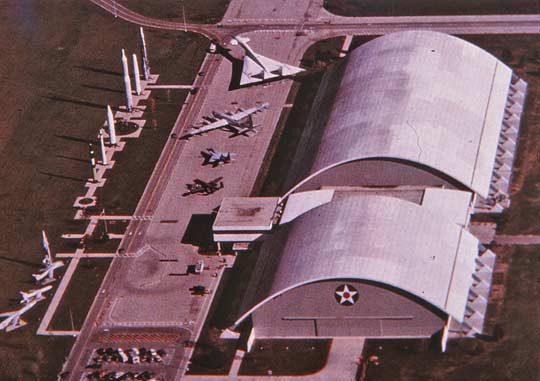
Wright-Patterson Air Force Museum.
AH: Oh, Dan Fry, sure, yeah.
AC: In White Sands.
RF: That’s right, and you remember the White Sands and so forth.
AH: I read it.
AC: He was traveling…
RF: To New York, he is the guy that they took for a ride and he could read the marquees in New York from a thousand miles up, you know, because the portholes in the vehicle were like lenses, well, I saw here on the corner of Rosekrantz and Sepulveda, there is an electronics company by Dan Fry, it says Dan Fry’s Electronics Co.
AC: Really? It’s still there?
RF: I think it is.
AC: Is he still alive?
AH: Yeah, I met him a couple of years ago in Eureka Springs.
RF: I had an interview by the gentleman who was at that time the editor of Lighthouse… he came to Wright-Patterson to talk to me, and he, at the time I had on my board and it was written in Arabic, something about ‘don’t put off till tomorrow what you can do today,’ that’s really what it said.
AH: But in Arabic?
RF: Yeah, [laughs] but he thought, he made a big thing out of it, God, I can’t write it, but he had talked to Fry and he had tried, he said Fry wouldn’t talk to him, wouldn’t give him the time of the day, and he said, man, here you are with the damn story of the century and you won’t talk to me, so I don’t know what his attitude today is about that, but from that particular incident I would say he apparently had had some bad experiences that didn’t want or care to talk much about it.
AH: I guess he did work for Aerojet.
RF: Yeah.
AH: You remember a guy because he told me the story that he met at that time, Mosely, Jim Moseley?
RF: Uh-hu.
AH: You received him at Wright-Patterson at that time?
RF: Uh-hu.
AH: You do remember him?
RF: Yeah, well, you know, I can’t remember the names, there were a couple of guys who tried to pull a good policeman, bad policeman job on me, one of them came out and said, you know, this guy is going to try to make me say, but I really didn’t have anything else to say to him other that what I had said to his friend, which were the facts.
AC: You never met in your time Wendelle Stevens?
RF: Who?
AC: Wendelle Stevens? He was in the Air Force?
AH: Yeah, he was a Colonel.
RF: Wendelle Stevens?
AH: A Lt. Colonel, I guess eventually he became a Lt. Colonel.
RF: I don’t think I know him.
AH: Because he says he was with ATIC.
RF: He was?
AH: Yeah, but he was in Alaska, he says that I guess in the late 40’s he was involved with reports of UFOs and things.
RF: I am sure.
AH: And now he is a big promoter.
RF: Oh really? OK, what year was he there?
AH: He would have been all through.
RF: I mean, when he was in Alaska?
AH: I think Alaska would have been around 49.
RF: OK, he was before my time.
AC: Second World War.
AH: No, it was after Arnold.
AC: He is older than you, he is 73 I think.
RF: Well, that’s my age [laughs].
AH: And he was also an air attaché later in South America.
RF: Oh, he was?
AH: Yes, in Bolivia, so you don’t remember him?
RF: No, I don’t, but I can understand that he had become an air attaché because, well, most of the people who were in Foreign Technology, if they wished to pursue that area, became air attachés, or ATLO’s, it could be either one, an air attaché or an ATLO which is Air Technical Liaison Officer with the Embassy.
AC: And you met James MacDonald? Professor MacDonald, who was with NASA?
RF: You know…
AH: He wasn’t with NASA, or maybe as a consultant, but he was with the University of Arizona, Planetary or something.
RF: Yeah, that’s what I thought, he may, there is no doubt that a lot of these people were possibly with these organizations as consultants, which I could never understand [?], he was with Convair…
AC: He was involved with Boeing studies of the production of the ozone, OK?
RF: This is the man who proposed that a lot of these things were frozen gases.
AH: Wouldn’t be Klass, Phil Klass?
RF: No, he was with Convair, his name will come to me as I talk, but what he was indicating was that a lot of these things were really frozen gases and that’s why you can see these things that seem to defy the laws of physics, you know, they come in and suddenly whiz they shot right turns and things like that because what happens is they change state, as they come in and all of a sudden it’s simply a gas, does these various things, well, he lived right here in Costa Mesa after he retired and he also had been in NASA, had been head of their space program, one of their space programs, Dr., can’t get his name.
AC: From the 50’s?
RF: Yeah, well he was with Convair during the 50’s and later I guess became involved with NASA and he was responsible for one of their space programs.
AH: So what’s your feeling now after all these years of what UFOs are, I mean, I know that a lot can be explained. But you think there is something else going on?
RF: Well, I tell you how I feel genuinely, OK, number one is, I certainly believe there is other intelligence in this big, big thing that we live in, right, we are a very small part of it, but I do find it very, very difficult to believe that life as we know it…
AC: Human life.
RF: Well, I don’t know whether to call it human or whatever you may want to call it up there, it really wouldn’t all be human, after all, we are the ones that define human, I guess, OK, if we want to impose limits on what’s human, OK, but the thing is that life as we know it and life as we can appreciate it, I find it very difficult to believe that we have been visited by any beings that would fall within this category, now, one of the things that I’ve said, if we say, for instance, that to get, to be developed for instance to where we are today, that a sun has to have existed for a certain amount of time, that the planet had to go through all the evolutionary processes to get there, right, and we would say looking at something out there what, 25, 21, 21 and a half light years, and you say, I think I am going to leave here and I am going to go there because I know there is a planet, because we certainly have a capability that we don’t of seeing that, and one would think that if they have progressed to the same point that we are, that they generally wouldn’t, I wouldn’t anticipate that they would go this far with technology [a bit?] more sophisticated, now if it’s beyond that, then of course we would have to expect that life itself had evolved beyond that, and I really and truly don’t know what form it would take.
AH: Who knows?
RF: You know, it’s just like, for instance, I guess the people say, Oh Jupiter, and they think, well, it’s a very big planet, so if there is people there they must be great people, right, I would think that it’s the other way around, I would think that because of the gravity that they would probably be much smaller, you know, after all ants can adapt, look at the things they can do here that even we can’t do, and they are smaller so can do it, so I would anticipate that it being in the other direction rather than these great, monstrous people, and so while, as I said, while I believe that what we have here, this solar thing is probably duplicated any number of times, that we have yet progressed to a point where we can go from here to there and they can go from there to here, now if there is something else that, I said, it’s certainly far beyond my comprehension, and I’d be willing to accept it, if I can see something that I can identify with to prove it to me, as I said, I can’t say that person’s wife say, hey, I saw a UFO go by, I know it’s from someplace else, I can’t tell, no, it wasn’t anymore than he can tell that it was.
AC: And you think there is not any scientific proof they are visiting us from outer space, or from another dimension, a perfect case?
RF: Well, I don’t even need a perfect case, I would just have to need something that really and truly slanted in that direction a lot more than the kinds of things that’s happening here now, I think that the scientific community itself have a willingness to accept the possibility of living and space travel, we’ve accomplished that, I think they can appreciate that, OK, but to think that a person right now can say, well, I am going to navigate and I am going to go to that place which I don’t know what’s going to look when I get there, you know, you take, for instance, for us to travel at the speed of light, certainly we couldn’t stand the accelerations to get there unless it occurred at something in a reasonable G level, right, OK, so let’s assume, how long would a guy have to live in a 2-g environment to go up to the speed of light and how long would it take, right, God, he is sitting in an environment like that for almost a year in a 2-g environment to get to the speed of light, in 2-g acceleration, that’s a long time, you know, and then all of a sudden you get there and what, you are going to navigate to something that you don’t even know that that’s where it is, in fact you know it’s not there the way you see it because, well, where we see it today that light took what, 25 light years to get here, so it’s 25 light years out of place, we may know where it is if we project where it is and say that’s where we’re going, but even when you get there you don’t know that will be anything there that it can do you any good.
AC: In the law of conservation of energy it’s not logical that these people would come from outer space from universe and they would show around to a farmer to make pancakes [reference to a story that is reviewed later in this article].
RF: Well, that’s true, I can accept a lot of things like the business of using solar winds and so forth for power and things of that sort, but I also realize that if you’re using nothing more than that kind of energy, it will be a long time, if you don’t believe it all you have to do is look at a comet, they are a long time out towards and they go way out, it’s because that portion of the journey after they go around the Sun and swing out, that part of the ??? it’s very, the outer lips is very way out, what is it 86 years for Halley?
AH: Yeah, 76 years or something like that.
AC: Now when people throw their extraterrestrial hypothesis about UFOs using gravitational forces, also Hynek used to say, I talked to Hynek and Hynek always tell me, they could jump into space, time-space.
RF: Well, you almost have to accept certain things, you know, is like when somebody says that there is nothing faster than light, right, and you say, OK, if there nothing faster than light, then what causes a black hole? OK, it’s something that’s precluding a light from coming and moving, there is nothing, right, a black hole there is no light, right, so there is something keeping, making sure that the light doesn’t move, OK, we don’t get a chance to see it and, I can accept the fact that if at the present time the only thing that we know is the speed of light and the nearest things that we can identify with are out there at distances like in the 20’s in light years, it’s a long time, and as I said, we are not even talking about the fact that, hey, we got to accelerate from nothing up to, that’s why I added the time because if it takes you a year to get to the speed of light, that means that that’s two years because you only went half the speed of light for that period.
AC: Too much time.
RF: Yeah, when I said that I am talking as far as the travel, plus the fact that you have got to have the means to decelerate from the speed of light right down when you get to the other end.
AH: Right, but many investigators, you know, although the popular perception is that UFOs are extraterrestrial, but many investigators, especially in Europe, they don’t believe it anymore, they propose other things.
RF: Well, that’s what I said, if you want to identify with something that it’s currently beyond us, that’s fine, I can go along with that like the business of dematerializing and then rematerialize someplace else, but your point is, you got to get that material from here to there, and I don’t know, whatever that route is, and not only that, after you get it out there, you got to reassemble it and reassemble right.
AC: [Talks about some videos from Nevada]
RF: It’s possible, we believe relativity and certainly people can make that trip, the thing about it is that when they came back they wouldn’t know anybody that was there.
AH: Right, the Einstein paradox.
RF: [Laughing] Right, might not even find anybody who knows that they left, that’s what I said, it’s quite possible, the thing about is, with some of the experiences that people have, who knows, maybe these things are happening to us, right, I remember the story of the Brazilian peasant, the medical, the surgeon…
AC: Villas Boas?
RF: I can’t remember his name, but anyway, the thing about him was that while he was operating he spoke German.
AC: Ze Arigo.
RF: Right.
AC: So he had communication with a German.
RF: Right.
AH: In Chile there was a similar case too of a society lawyer [Jaime Galte].
RF: And some of these other cases, I read a story of the people in Texas watching their TV and all of a sudden there was a station that had been off the air for 5 years.
AC: Was that a true story?
RF: Well, there so many people that saw it, now, whether or not somebody down there did have a tape and pulled a hoax, I don’t know, but the thing is it was very widespread.
AC: The signal bounced on an asteroid and came back?
RF: Well, that’s what they said, the signal could be there and who knows, life is what? We may just be using these bodies for a little while, that’s the next big adventure, who knows what it is, so I think I can accept anything and whenever I went out on a case and I talked to the people, I let them know that beforehand, I am not here to ridicule you, I am just here to try to get the facts and hopefully we can all benefit from it, I know that they had an experience and, you remember the essence of the gentleman that had the cakes given to him, the space cakes.
AH: Oh yeah, they still have them at the [Wright-Patterson] Air Museum.
RF: I put them there.
AH: You put them there?
RF: Yeah, I put them there, there were six of them originally and after I brought them back, what I did was to send three of them to the labs, now I send one to the Food & Drug Administration, and I sent one to a lab in New York called Sam Tuttle [phonetic spelling] which we had under contract, and that was one of the other things, all of the agencies in the government used to be very, very willing in support of us, anytime I had anything I send it to the FBI, I send it to the Weather Service, I send it to anybody that I thought would be able to do the best job on it, so I send this [pancakes] to the Food & Drug Administration, now, they not only told me, FDA, not only told me that they were pancakes, but they would tell me whose they were, and what the composition was, just everything laid down, Sam Tuttle lab in New York gave me the complete composition and they would match, that’s why I send them to two places, I said, well, if get the same answer from both these guys, they don’t know [the other lab is also analyzing it], Food and Drug and Sam Tuttle, so then I talked the entire story over with the psychologist, that was the other thing too, because in Wright-Patterson there was awful lot of work going on that maybe people weren’t aware, that is in the preparation of the business of space travel, we had guys who used to sit in chambers for weeks at a time in isolation and the guys were just studied to see whether or not they would be able to survive and do jobs in space, right, and these people also were there to do other kinds of jobs for the Air Force, the psychological aspects of people who have to perform in combat, you can appreciate, and under very strenuous conditions, so when I talked to them [psychologist] and the guy went back up there with me and he said to me, this man had an experience, because if you remember the circumstances, this guy, he was isolated, I think snowed in and when the first time he was able to get back into the town, take the trip into town, this is when he came in and said that this spacecraft had landed and what they had done was to offer him these cakes, they actually traded the cakes with him for some water, right, and so this guy [psychologist] said, the most dangerous thing we can do was to convince the man that what he had had was a mental aberration, because he says, as long as he believes it happened, he can live with it and there is no problem, but if the Air Force was going and say, hey buddy, you don’t know, he said, the guy would really have a problem and there was nothing for us to gain… what the psychologist said to me was, he said there is only two people in this town who are out of step, you and me, everybody else is perfectly happy, the guy is happy with it…
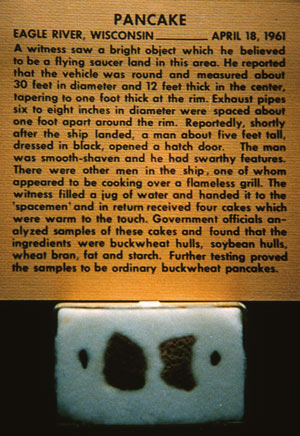
Pancake in the UFO Museum.
And when Sputnik deorbited, what happened is that when Sputnik deorbited a bearing came in and hit in this little town in Wisconsin, and we recovered it, and at the time [we thought] well, we can prove this thing has been in space, right, because all we have to do is take it to two labs in the country, there were only two at that time, one was at Harvard, the other one was at the University of Chicago, where we could see if there was any tritium present, and the University of Chicago was tied up so we took it to Harvard because Dr. Whipple was the foremost authority on this business of meteorites, and so but, boy, at first he didn’t want to touch it because of the UFO, but after he got it and found that it was indeed something that had been in space he didn’t want to give it back [laughs]. We treated everything as seriously as we could, you know, one of the fraternities at Pittsburgh did a thing on us.
AC: Fraternity? Masons?
RF: No, it’s a college, and we had this report about this UFO seen down there with all kinds of strange things, and so we talked with the police, we had to cordon off the area, all these things to investigate it and what we found out it was a plastic unit that it was made, it had a mercury switch in it and batteries and a light on it was flashing, noise was coming out, it was coming from a little electric motor.
AH: Oh, that’s also in the [Blue Book exhibit] panel, you designed it?
RF: [Laughs] Yeah, well, it just happened, we put, one of the gentlemen that we had there at Foreign Technology, Pearce, was a kind of guy who said, hey, why don’t we put some of these things up where you can see them, when people come in we’ll tell them about it, so what we did, we had some of the pictures blown up and…
AC: You must have had a lot of pictures and souvenirs?
RF: Well, a lot of the photography, there was this lady who took a picture from one of the tour ships while she was going to the fjords, and it came with a big ray, a colorful thing, she said she saw it, she took the picture and everything else, but no one else saw it on the ship, she was the only one, so we look at it, it looked very much like as if there was some light source into her camera, but she would not release the camera to us, that’s what it looked but she wouldn’t release the equipment, and I know you saw a lot of the movie strips that were taken in Utah and Tremonton.
AC: Yeah, I have copies of them.
AH: They are very popular with the media.
RF: We put a Committee in addition to the scientific people also had the chaplain and also a lady on it, and the idea was to try to get as much of a cross-section as we possibly could, trying to get different views of how the people perceive the reports, you’d be surprised of how many reports we got from women, and also you’d be surprised of the candidness of kids, in the committee what would happen is we would get the report and we have an astronomer, we had an aeronautical engineer, the chaplain, the physicist, the electronics specialist…
AC: What was your relation with Hynek?
RF: Mine? Oh, mine was fine.
AC: Quintanilla didn’t like him and Hynek didn’t like Quintanilla.
RF: Well, I think that’s quite true. Gregory didn’t like Hynek, also I think he had his differences with Foreign Technology, whenever we talked to the Congressional people, I think the thing you needed to do was to tell them the truth as much as you possibly could, I think, I told them everything I knew, I also gave them my candid views…
 Openminds.tv Credible UFO / UAP News and Information
Openminds.tv Credible UFO / UAP News and Information


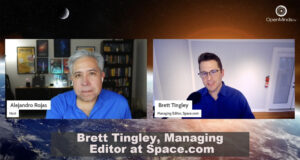
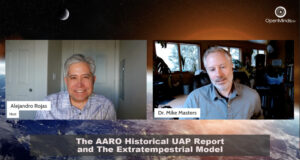

bueno YO no ablo ingles pero voy a dar mi punto de vista yo vivo en la frontera a USA en tamaulipas Reynosa yo en lo general recuerdo aver tenido algun avistamiento hace mucho tiempo desde entonces deje de ser eseptico y me volvi creyente CATOLICO CRISTIANO por que se que el ser mas poderoso es el SEÑORjesucristo en fin mi Historia a Raiz de eso e Leido varios libros de testimonios de antares como la BIBLIA donde nod cuenta le Historia dentro de la misma Historia leei tambien el APOCALIPSIS y esa Historia cuenta lo que le paso a las personas que dudaron de la palabra de ese libro tambien e visto peliculas como la de 2012 que cuenta sobre algo que va a pasar en ese año algo que tiene que ver con lo que estamos viviendo en nuestro tiempos algo que los dioses indigenas esperaban que pasara y paso tambien vi una pelicula llamada el CUARTO CONTACTO que trata de un acontesimiento que paso en ALASKA CON UNAS PERSONAS en ese pueblo alo que voy por que se tanto no lo se quisiera que alguno de ustedes sabe por que me siguen pasando cosas y si en algo puedo ser util doy mi ESPIRITU de lucha para poder ayudar a otras personas ….yo puedo suponer que es lo que pasara en el 2012 solo necesito ayuda y orientacion tienen mi direccion de correo me gustaria que me contactaran ….
soy del 23 de noviembre de 1981 5:1. hora
ese dia hizo erupcion el volcan de SANTA HELENA(80)y hubo un terremoto en ITALYA (81)…….GRACIAS…
I found all the UFO secrets the government kept out of the PROJECT BLUE BOOK…
https://www.amazon.com/dp/1513645854